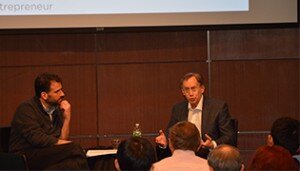It is atypical for a scientist to draw crowds from across all of NYU’s schools – from engineering to teaching to business. Then again, Dr. Robert Langer has always been an exception to the rule.
On January 29th, prolific biomedical inventor, serial startup founder and MIT Institute Professor, Dr. Robert Langer visited NYU for a fireside chat with Frank Rimalovski, executive director of the NYU Entrepreneurial Institute. He discussed his lab and shared his thoughts on the intersection of academia and entrepreneurship.
Dr. Langer has received numerous awards, including the United States National Medal of Science, and has been named one of the most influential individuals in biotechnology. He has published over 1,000 articles and holds over 1,000 patents – a testament to the balance between academic focus and entrepreneurial thinking that is a pillar of Langer’s work.
With so many accomplishments to choose from, which is Dr. Langer most proud of?
“My students,” Langer replied, “when I look at how well they’ve done, that’s what I’m proudest of.”
 His world renowned “Langer Lab” focuses on developing biomaterials, with a strong focus on drug delivery and tissue engineering. While many of his graduates stay in academia – Langer estimates that about 300 are now professors all over the world – many also go on to become CEOs, entrepreneurs, and venture capitalists.
His world renowned “Langer Lab” focuses on developing biomaterials, with a strong focus on drug delivery and tissue engineering. While many of his graduates stay in academia – Langer estimates that about 300 are now professors all over the world – many also go on to become CEOs, entrepreneurs, and venture capitalists.
How do students from the same lab end up on such different career paths? Langer calls his lab an “ideas factory” where he encourages people to think for themselves and be leaders. “It’s not my goal to tell people what to do,” Langer said. “It’s my goal to get them excited about science, to get them talking to each other and asking questions.”
By focusing on creating an interdisciplinary and collaborative environment, lab members can take ownership over their projects and learn from one another rather than competing.
Rimalovski also asked Langer to address the tension between academic and commercial endeavors, and the too-common belief that the two are incompatible.
Langer disagreed ardently. “I think that science is for knowledge, but why would we not want to do good to help people?” He believes that pursuit of knowledge and commercialization are not mutually exclusive, although he acknowledged that some people let financial interests influence the research and stressed the importance of scientific integrity.
This belief is part of what Langer described as the “engineering culture” which is strong at MIT and very different from the culture at medical institutions. He elaborated, “In engineering, it isn’t controversial to want to take your ideas and make products out of them.” Entrepreneurship is seen as a logical step following successful academic research, so there is not as much tension.
Given the large number of commercial endeavors that have come from Langer’s lab, Rimalovski asked him how he decides when a project is “ready for prime time.” Langer listed five criteria he uses:
- Is it a platform technology that can be applied to a variety of projects? If not, licensing might be a better option
- Make sure you have a “game-changing” paper to publish
- Good patent protection
- The technology needs to be “reasonably advanced” -- since medical advances take a long time to reach an exit, you need to have solid data before going to investors
- The idea has a “champion” in the lab who is passionate and will put in the time and work to make sure it is successful.
Dr. Langer’s insights proved relevant to the entire audience, despite the wide range of backgrounds represented.
His most valuable advice for budding entrepreneurs? “Follow your passion.”
About the author:
Matthew Murphy is a PhD candidate in the Stem Cell Biology program at the NYU Langone Medical Center. He is interested in the intersection of science and business, taking problem solving skills and medical expertise from academia and applying them to industry. As a leader of the NYU Biotech Association, Matthew helps the students and postdocs of the NYU community learn about and prepare for career opportunities outside of academia.







